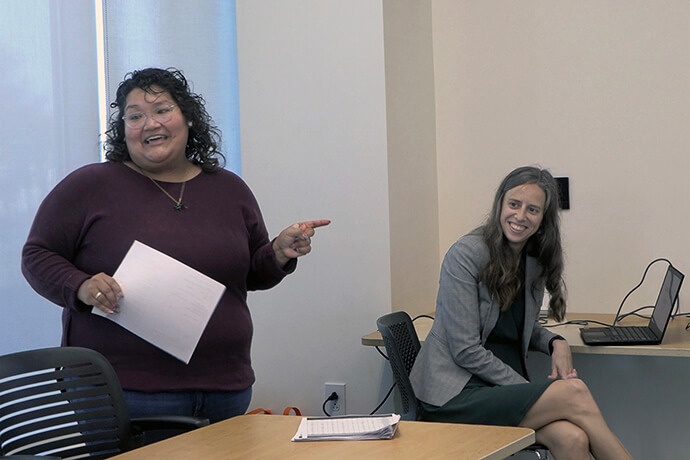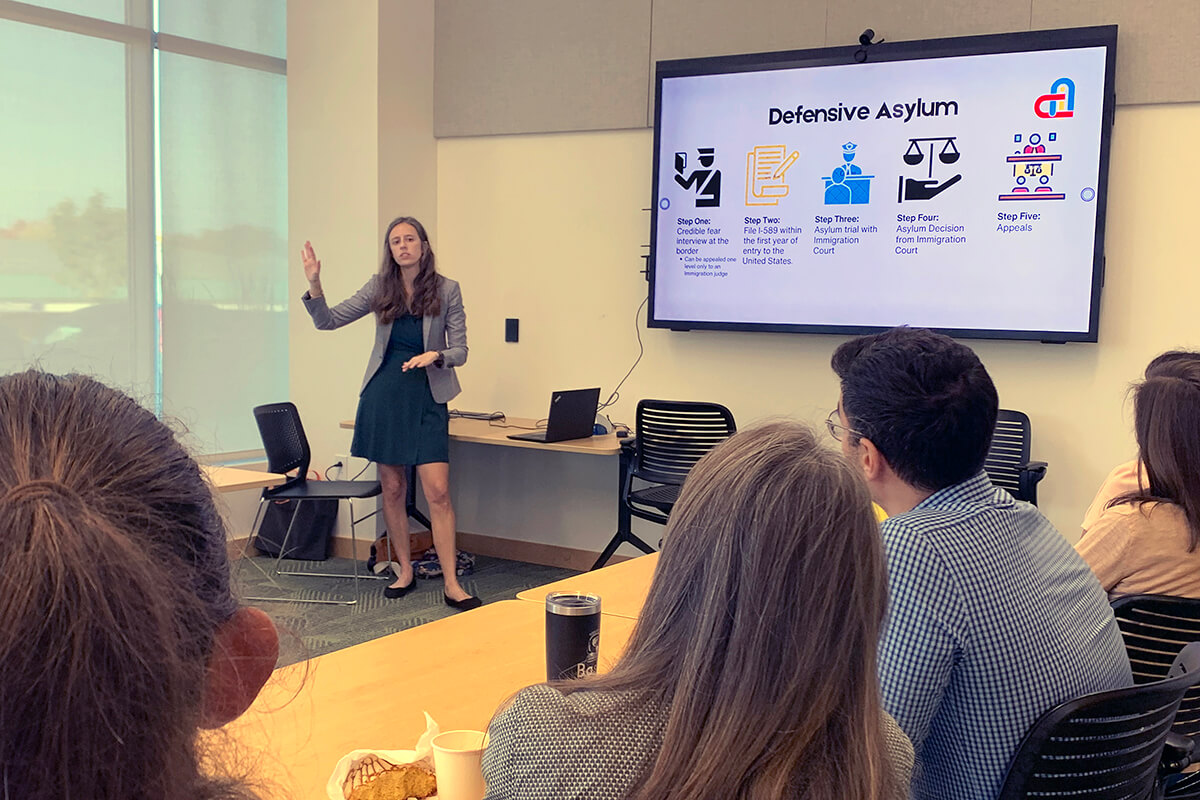Key points:
- Neighbors Immigration Clinic in Lexington, Kentucky — part of the United Methodist Immigration Law and Justice Network — is one of few legal resources for the state’s growing immigrant community.
- Kentucky is among the top states for refugee resettlement in the U.S.
- The clinic has begun offering workshops on topics like asylum to engage community partners who also work with immigrants.
The process for seeking asylum in the U.S. is lengthy, confusing and often frustrating, but on a chilly October morning, Katie Taylor is attempting to explain it in about an hour.
Taylor, legal director for Neighbors Immigration Clinic in Lexington, Kentucky, is sharing the ins and outs of the asylum system as part of the clinic’s regular workshops to engage and inform other community partners who work with immigrants. Attendees at this workshop come from public schools, social work organizations, churches and even health care.
“It’s good to have a swath of people in different areas,” she said. “If we want to disseminate information, I don’t need 30 people from a school district. I need one who can then share.”
Taylor said it’s helpful to focus on a single specific topic she can discuss in depth.
“Normally we’re doing ‘Immigration 101’ presentations, where I have five seconds to talk about asylum because there’s too much to cover,” she said.
Kentucky is among the top states for refugee resettlement. Refugees from the Democratic Republic of Congo, Syria, Somalia, Afghanistan, Myanmar (Burma) and Ukraine have all found a home here. Neighbors Immigration Clinic is one of the only options for low-cost legal services in the area.

The clinic is one of 19 sites across the country affiliated with the Immigration Law and Justice Network, a United Methodist ministry. Previously known as Justice for Our Neighbors, the network was established in 1999 by the United Methodist Committee on Relief to provide free or low-cost expert legal counsel, advocacy and support services to immigrants as they seek legal status in the U.S. Since its founding in 1940 during World War II, UMCOR has consistently stood alongside displaced people across the globe, assisting those impacted by war, civil unrest, and human-caused and natural disasters.
“We’re here to support churches and organizations working on welcoming migrants,” said the Rev. Jack Amick, UMCOR director of global migration and special assignments. “We want to share the journey and welcome to society those would be otherwise excluded or pushed out. Their voices need to be heard.”
Mizari Suárez, the Lexington clinic’s executive director, has firsthand experience with both the complex immigration system and the life-changing benefits of citizenship. Her family came to the U.S. from Mexico, and she grew up undocumented.
Becoming citizens, she said, “changed my family’s trajectory right out of poverty into business owners, into graduates from universities, leading nonprofits, leading businesses in the community.
“This is what an immigrant can do in our state if we give them the possibility to be who they are meant to be. We’re trying to do that by helping individuals find legal ways to stay here and enhance their quality of life, and not just their quality of life, but the entire community’s.”
The church’s stance on immigration
The revised Social Principles adopted by the 2024 United Methodist General Conference state:
“We affirm the dignity, worth and rights of migrants, immigrants and refugees, including displaced and stateless people. … We urge United Methodists to welcome migrants, refugees and immigrants into their congregations and to commit themselves to providing concrete support, including help with navigating restrictive and often lengthy immigration policies, and assistance with securing food, housing, education, employment and other kinds of support. We oppose all laws and policies that attempt to criminalize, dehumanize or punish displaced individuals and families based on their status as migrants, immigrants or refugees.”
Neighbors Immigration Clinic was founded in 2019 with encouragement and support from the Rev. John Gallaher, lead pastor of Embrace Church, a United Methodist congregation in Lexington.
After hearing about Justice for Our Neighbors, Gallaher saw the need for a legal services clinic in the community. He and his wife ran a nonprofit that hosted after-school and summer programs, and many immigrant families participated.
“I saw a big gap where people were needing help with legal services,” he said. “There are only two other nonprofits here doing legal services, and they’re overwhelmed.”
Gallaher said he didn’t have time to oversee a second nonprofit in addition to pastoral duties, but he could help start one.
“A woman in our church who was a Harvard law graduate agreed to get involved, and a lot of people from our church served on the first board. We also donated space in the church building to Neighbors for their first few years,” he said. “Since then, it’s gone way beyond our church.”
Suárez said the idea for workshops came because they get requests for help from various parts of the community.
“We all work in different networks and different silos. This idea of bringing people together who all care about this topic in their different capacities and roles has been the most beneficial,” she said.
Attendee Jenna Potter works at Community Response Coalition of Kentucky, which runs a program that helps immigrants file asylum claims. She said they consider the Neighbors clinic a “go-to” resource.
“It was helpful not only to hear the statistics of asylum being granted but (also) perspectives on different ways of approaching the case itself,” she said.
Karen Callahan, a mental health specialist with Fayette County Public Schools, said she is the only person who speaks Spanish at her job.
“I have to attend to all Hispanic students who speak little or no English,” she said. “This topic is touched on almost daily, and I am the only one who can help them in this regard.”
Community health worker Noemi Lara Rojo said patients often ask her about legal resources and it’s important to stay up-to-date on changes to the asylum process.
“There is a lot of unknown about it and how it affects the medical service that people could receive,” she said. “For many of these questions, I don’t have an answer. But I found some of those answers in the workshop.”
Taylor said asylum is often mistaken as a U.S. policy when it is actually an international United Nations treaty, created after World War II as a response to the Holocaust. Under that treaty, claiming asylum to avoid persecution in one’s home country is considered a basic human right.
“There’s been change in the narrative as arrivals at the Southern border have drastically increased,” she said. “Visas can have caps, but asylum is supposed to be an absolute humanitarian right to apply. There is no ability to cap it the way the treaty is written.”
Though immigration has become one of the most contentious modern political issues, Suárez said the debate has a long history in this country, beginning with the Chinese Exclusion Act.
Taylor said most applications are initially rejected and must be appealed. In the federal district where she practices, that rejection rate is over 90%. Conflict throughout the world has led to a rise in people coming to claim asylum and created a backlog of cases that would take years or possibly decades to settle.
“From a human empathetic level, it matters to understand that these people fled their homes,” she said. “It’s not like everyone just wants to live in America; it’s that everyone wants to be safe. What if you had kids that you couldn’t feed or keep safe? Would you not go to the ends of the earth to protect them?”
Speaking with UM News shortly before the Nov. 5 election, Taylor said that her job was to prepare to work within whatever parameters the next administration may set.
As promises of mass deportation were a main focus of the Trump campaign, immigration advocates are concerned about what his victory will mean. However, Taylor said, nothing is likely to be implemented quickly.
Subscribe to our
e-newsletter
“The presidents will make a rule, then it will get sued over, then we have to wait four years for a court to make a decision before things come to pass,” she said, adding that she saw this happen in both the previous Trump administration and the Biden administration.
Since the election, Suárez said she and Taylor have been “scenario-planning” and are “prepared to hit the ground running” by educating the community on how to interact and work with immigrants. She emphasized the need to involve the faith community.
“To stay true to our roots as a United Methodist ministry, we need to get to the hearts of the faith community, and the faith community needs to be willing to have these difficult conversations with us. It’s the only way forward,” she said.
In a Dec. 2 statement, the United Methodist Board of Global Ministries and UMCOR pledged to prioritize support for migrants and refugees, and top executive Roland Fernandes said the agencies would intensify efforts to amplify the voices of migrants and create pathways for integration.
“Through comprehensive programs spanning global advocacy, church engagement, legal support and practical assistance, Global Ministries and UMCOR will continue to provide hope and support to those most vulnerable in their journey to safety and opportunity,” he said. “We believe that welcoming the stranger is essential to The United Methodist Church.”
The United Methodist Council of Bishops encouraged the church in the U.S. to remain steadfast in defending human rights and welcoming migrants, immigrants and refugees. “We are living in a dark time that more than ever calls us to be the light of Christ,” said the bishops in a Dec. 18 pastoral letter.
With its United Methodist ties, Neighbors Immigration Clinic values partnerships with the faith community. One program it offers — “Welcome Thy Neighbor” — focuses on generating financial support from faith organizations.
“We share a one-on-one presentation on immigration,” Suárez said. “The hope is that they will join us in collaborative work, putting to action what a lot of our faith communities say that they do like loving thy neighbor and not turning away the immigrant or the poor.”
However, Suárez said, the program has often struggled with church involvement.
She said it’s been “a hard battle” to find churches “willing to open up their hearts and their congregation doors for us to come in and share the work that we’re doing.
“Through this program, I’ve come to realize that we all don’t know the same Jesus. The Jesus that I know would walk alongside us and would do this work, and would probably be protesting with us.”
Though immigration is a disputed issue even in the faith community, Amick said the biblical mandate for welcoming migrants is strong.
“Welcoming them will change us, change society and maybe change our church — all in positive ways,” he said.
That’s why UMCOR supports the Immigration Law and Justice Network and offers programs like Mustard Seed Grants, designed to encourage local United Methodist churches to engage in ministry with migrants in their midst.
“We hope to change the hearts of people in the congregations. People can have experiences with migrants and may change their idea about what it’s like to be in relationship with migrants and learn from them,” Amick said.
Describing her multicultural neighborhood, Taylor said her life has been enhanced by what she’s learned and shared from her immigrant neighbors. She encourages others to step outside their silos.
“So often when I hear anti-immigrant comments, they come from people who do not have any friends who are immigrants,” she said. “There’s this fear, but go meet your immigrant neighbors and then you’re not going to be so scared of them. You’re going to realize they’re just like you.”
Gallaher agreed.
“I wish more people could see we’re stronger as we welcome more immigrants and diversity to the community,” he said. “My life has only been enriched by them. They’re a gift, not a threat.”
Butler is a multimedia producer/editor for UM News, and Vasquez is director of Hispanic/Latino Communications, United Methodist Communications, in Nashville, Tennessee. Contact them at 615-742-5470 or [email protected]. To read more United Methodist news, subscribe to the free Daily or Weekly Digests.




